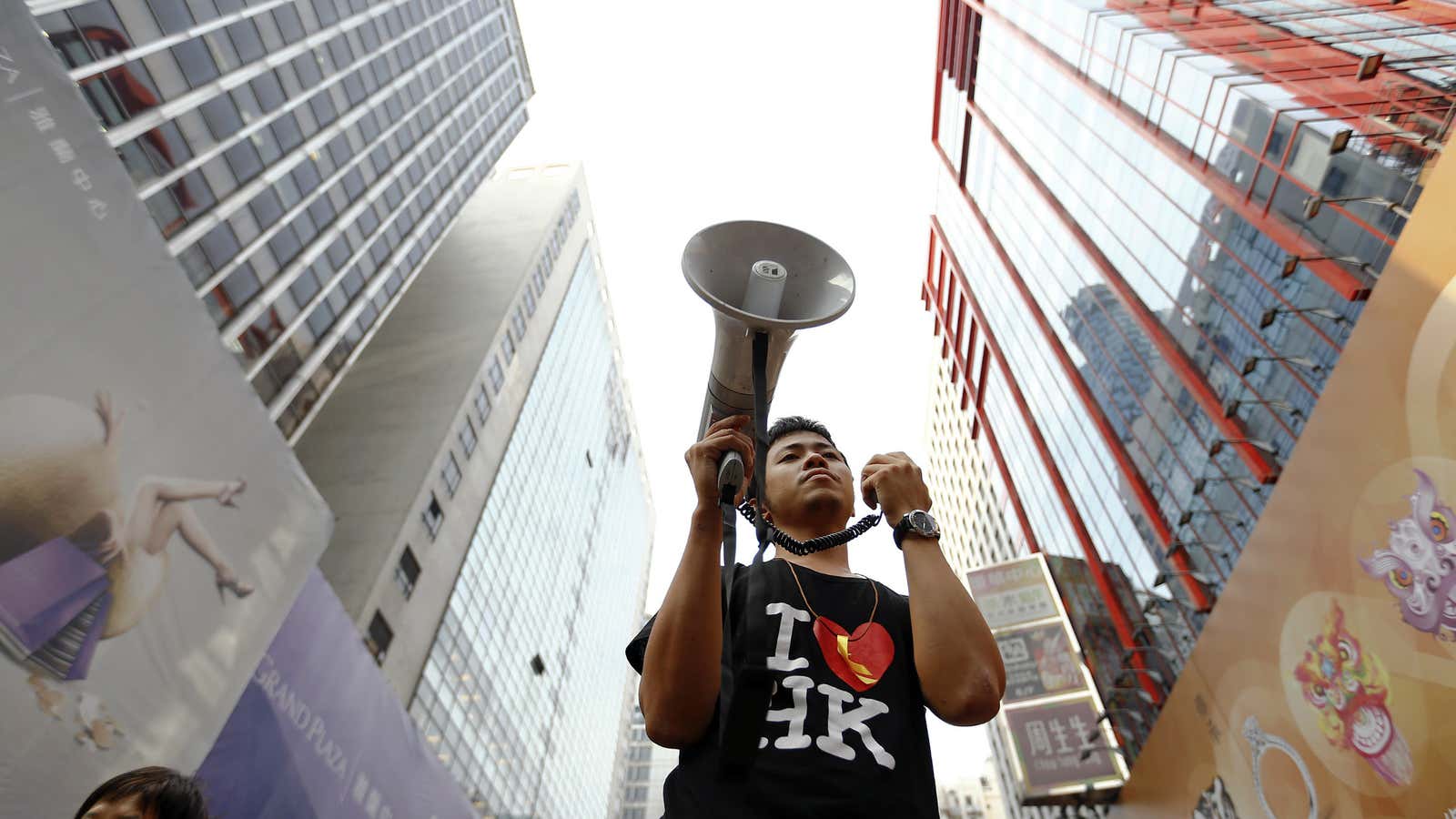HONG KONG—Hong Kong police are using a broadly-written computer crime law to dissuade protesters from organizing on social media, a move that many advocates worry is restricting free speech in the city.
On Oct. 18, a 23-year-old man with the surname Tam—his full name has not been released—was arrested in his Tin Shui Wai home, and charged with “access to computer with criminal or dishonest intent” and “unlawful assembly,” according to police. Tam’s’ crime was to post a new thread on HKgolden, a message forum popular with pro-democracy protesters. The thread (link in Chinese to an abbreviated, cached version) was titled: “occupy Mong Kok on Friday, occupy Lung Wo Road on Saturday, and occupy Central on Sunday”
Tam’s post, which went up on Oct. 17, got dozens of responses from forum users, many of whom said they would join in. That night, thousands of protesters, including Tam, streamed into Mong Kok, re-taking an area that had been cleared hours earlier by police.
The next day, police announced Tam’s arrest, without naming him, and said he had incited others in an online forum to join the Mong Kok assembly, charge at police, and “paralyze” the railways. “Inciting others to take part in unlawful assembly in that area and charging a police cordon…is a very serious criminal offense,” Police spokesman Hui Chun-tak said. Whether Tam did encourage people to “paralyze” the railways or charge police or not is unclear—the entire message thread has been removed and only a cached snipped remains.
But his arrest worries free speech advocates in Hong Kong, who are already on alert after a summer of hacker attacks, media self-censorship and pressure from Beijing stifled pro-democracy voices in the city. The charges against Tam are based partially on Hong Kong’s “Crimes Ordinance Section 161,” which addresses computer crime and in the past has mostly been used to fight internet fraud and hacking. Violators who use a computer “with intent to commit an offense” face up to five years in prison.
Arrests like Tam’s are a new use of the law, free speech advocates say, and its application to online communication—not just cyber-crime—is worrying. “Law enforcement appears to have abused the computer crime law by attaching the charge of ‘access to computer with criminal or dishonest intention’ to all other criminal offenses whenever the use of computer is involved,” Hong Kong internet freedom group Keyboard Warrior wrote. “While laws like this one may have been developed to serve the public interest, they can become tools for political persecution if placed in the hands of a repressive regime.”
Tam isn’t the only protester arrest that Hong Kong police have made recently signaling they are studying what people post on the internet closely. Keyboard Warrior said there are “more than a dozen netizens in Hong Kong” who have been arrested under Section 161 since the protests started. Earlier public examples include:
- Two days before the Occupy Central fully unfolded, the police arrested the co-founder of the student group Scholarism, Joshua Wong, after he called on fellow protesters to break through barricades in front of government headquarters. Police “seized one computer, two SD cards, one USB and one connected hardware” from Wong’s university dorm room, the Hong Kong Economic Journal reported. After two days, a judge ordered Wong’s release.
- In June, a 15-year-old school boy was arrested by police for posting a guide to storming the Legislative Council building on the internet. The boy was charged under Section 161, and the police searched his home and seized his computer and mobile phone. He was released on bail.
Andrew Raffell, a barrister and consultant at the law faculty of Chinese University of Hong Kong, said the computer crime ordinance, which was first adopted in 1993, was not originally intended to police what is written by individuals on the internet. “The police and the prosecution have been allowed to artificially extend to the point of distortion the law,” he said.
“The concern now is whether there is an increased willingness for Hong Kong authorities to extend the law’s reach and, in doing so, whether they are joining a growing trend, particularly in Asia, to use general cyber crime laws to target online speech and other activities,” said Doreen Weisenhaus, director of the Media Law Project at The University of Hong Kong.
Tam’s latest arrest seems to have had a chilling effect already. In the past few days, netizens have posted less about attending protests in Facebook groups and popular forums such as HKgolden and MemeHK.
HKgolden administrators have advised netziens not to post anything that could break the law under its new interpretation. “No matter what the court’s final ruling will be, the defendant will suffer mental distress for a long time. We hope everyone could pay more attention on this (your online speech). Thanks everyone.”
